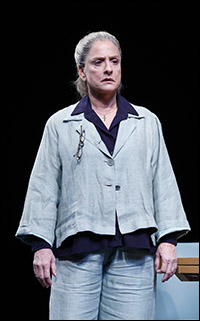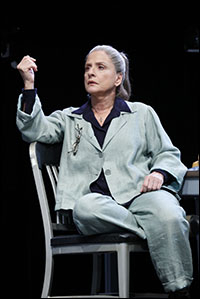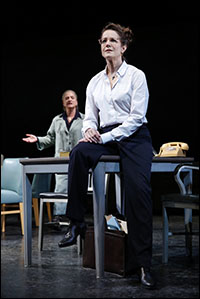
*
Patti LuPone and playwright David Mamet began their theatrical love affair in the 1970s while touring the country with The Acting Company. Over 30 years of opening and closing nights have gone by since that auspicious bus ride, and the two have gone on to win numerous awards including Tonys and the Pulitzer Prize.
Mamet and LuPone are reunited this season in The Anarchist. The playwright also directs his world-premiere drama, which centers on a woman (LuPone) serving a life sentence and an authority figure (played by Debra Winger) who will determine her fate. It opened Dec. 2 at Broadway's Golden Theatre. Critics dismissed the work, and by Dec. 4 producers announced that the drama would be short-lived — closing Dec. 16 after 23 previews and 17 performances.
Playbill.com spoke with LuPone prior to the start of previews, during the rehearsal period for The Anarchist.
I love the story in your memoir where you talk about meeting David Mamet in the 1970s when you were touring the country with The Acting Company. Does this feel like a homecoming for you?
Patti LuPone: Yes, it does. It's been 15 years since I did one of David's plays, it was The Old Neighborhood, and that was too long for me [to wait]. I learn so much from David when I'm in the room with him and I missed that. I miss being directed by him, listening to him talk about acting, listening to him talk about life. I miss the lessons I learn from him and I miss his friendship. We all grow and end up in different places. David lives in L.A. now and I miss that input and I miss that mind. He's also directing you in this. Mamet has his own style of directing. I loved his book "True and False" because it reminded me to search for clarity and get out of my own way. Is that freeing to you as an actor?
PL: Get out of your own way. Exactly... It is. I wrote about that in my book because the first time I heard it was from David. I was quite young it was in the late 1970s, and he said, "Let the script do the work you have the fun. Do not act upon the words." It's hard for young actors to understand that intellectually and emotionally. I think a lot of times actors feel they have to "act." And truly we're merely storytellers, and we're telling the story of the playwright, and that's all we're responsible for without comment. And David taught me that, in simple language. They may have been trying to do that at Juilliard, but thanks to David, I understand it.
 |
||
| LuPone in The Anarchist. |
||
| photo by Joan Marcus |
PL: I was at the opening night of Race, and afterwards I saw Rebecca Pidgeon [Mamet's wife] and I said, "Rebecca, I gotta ask David for a play. It's too long, this is just too long," and she said, "Do it Patti." So, I wrote David a letter and I said, "I don't want my relationship with you to end with The Old Neighborhood." And then he called me, and he started to talk about this particular play, The Anarchist. Time went by, and then I heard there was a London production. I said, "Find out whether I can go to London," and they weren't interested in me for a London production. So, I wrote David and I said, "Let me play it in New York," and he got on the phone immediately and he basically said, "Fuck London, let's do it here now!" I said, "You're directing aren't you?," and he said, "I hadn't thought about it." I told him, "You have to, because I know my best work is when you direct." My best work of David's work is when he directs me. Who better to direct his own work, in my opinion? I would much rather be directed by David than by anyone else. That started the ball rolling.
You really went after this one and got everything you wanted!
PL: It's the first time I've ever really pursued something like this. I don't go after anything, because I'm lazy. But David is just too important to me. He's too important to my development as an actor, and too important to me as a friend to have this experience go by without me being able to partake in it. What I treasure about it is that he's the only American playwright who has asked me to take part in an original piece, and for that reason alone I'd follow him to the ends of the earth. How much I learn from David every time I'm in the room with him — that's immeasureable. He's made me a better actor — every time I work with him. That's what it's about. I wanna be as good as I can be so the audience can come, understand the play, relax and then go home and argue the points. It's my responsibility to tell that story and not get in the way.
 |
||
| LuPone in The Anarchist. |
||
| Photo by Joan Marcus |
PL: Good material. It's really only that. I read a lot of bad material and it's depressing. But when it's good material, you can't wait to get on stage. I'm a stage rat, so that's where I want to be. I want to be on stage acting. This is truly, truly among the most challenging things I've ever done. It was one of the hardest things to memorize.
Audiences have only been given some buzz words about The Anarchist: Passion, redemption, deception, revolution. Can you elaborate a bit on what you feel it's about?
PL: I think it's ideas. It's an argument. David is presenting two sides of an argument. I play a prisoner who has served a life-term, she's been in prison 35 years, and she's had an exemplary record in the prison system. She's meeting with a fictional character, someone who doesn't really exist in the penal system, but is somebody who will judge me and determine whether I am fit to go in front of the parole board. And this is a long relationship that I have had with this same woman after 35 years. She is trying to find out whether I am suitable to go in front of the parole board. And I am trying to convince her I am. If anybody knows anything about politics in the 60's they will recognize a character. You'll recognize certain aspects if you know the politics of the revolution.
What is the atmosphere like in the rehearsal room? It's just the three of you, essentially, right?
PL: It's a loving environment. It's a protective environment. David loves actors and he loves the theatre. Where else would you like to be? Like I said, I love being in the room with David. It's fun and instructive. I can't think of a better rehearsal period. You want joy in the experience. He's right there listening and directing. There has been a great deal of rewriting and editing. That's what I love about David. He's not precious with his work — he wants to make it clear. David wants clarity. Also, it's work. Debra and I are just getting up to speed. I'm the kind of actor who loves a long run because on the last performance I get it. You have all that time to investigate and to deepen the performance. It's a remarkable play and I'm so lucky to be in it.
It's been a while since you originated a role in a new play.
PL: Here's my bitch right now. We're on a five-year loop of revivals. Where are the new playwrights? I mean, God bless Jeffrey Richards for taking on David and this new play. More producers should be taking on new works so we can grow as an audience and they can grow as playwrights. Where are the new fucking playwrights?
 |
||
| LuPone and Debra Winger in The Anarchist. |
||
| photo by Joan Marcus |
PL: We have fun. He's smart, but he’s also a regular guy. Whenever there's a break he's at the piano playing or writing a song, or we're reminiscing about the old days. David and I got in trouble when we were kids. I don't think he remembers doing donuts in a golfcart at the Breakers Hotel. We got thrown out! Is The Anarchist going to be a kind of explosive nail-biter?
PL: These are cerebral arguments and they're legitimate arguments facing people in prison today. I don't think it will ever be incendiary because it might diffuse the argument. The fireworks are in the language, not the volume of the actors, and that's the way it should be. Come in, and sit down, and listen. Let the play do the work, and let the play work on you. It may become incendiary, but we're still rehearsing. It's very tight writing.
I'm going to drag out that old argument in which people criticize Mamet for not writing strong roles for women. I know you have said you don't believe that to be true. Do you think The Anarchist will finally satisfy those critics?
PL: I have no idea! Because I don't buy into that argument at all. I have played several of his female characters and they are deep and emotionally complex women. I don't buy into it — I've played 'em! I don't know if this will deliver what those critics are looking for? Is it a Martha? [from Who's Afraid of Virginia Woolf?] It's a pity that they have an expectation. It would be better if they just came in and sat down and listened.
If you could pick any Mamet role to play, which would it be?
PL: I would love to have done the role in Cryptogram and Oleanna. I would have loved to have played all of David's women!
Any fantasy Mamet male role you dream of playing?
PL: Nah! [Laughs] I mean, well, I'm a woman, I don't necessarily want to play one of those parts. But, I also can't wait to see Bobby Cannavale as Richard Roma in Glengarry Glen Ross. He's so fabulous and that's a showstopper that part.










